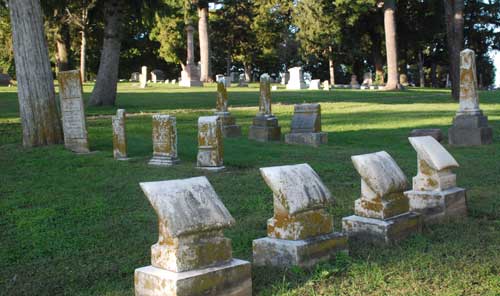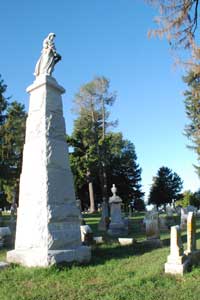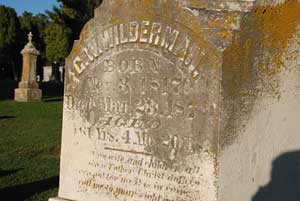
Our History
(Click here to see a current map of the Green Mount Cemetery)
 On July 6, 1873, a total of 150 acres of farm property near Turkey Hill was transferred to a group of citizens in the Belleville, Illinois area to be used as a cemetery. According to the deed, the land was granted by David Owen to the grantee, Theophilus Harrison. Articles of incorporation were filed within a matter of days, and on August 29, 1873, the Green Mount Cemetery Association elected officers: President W.C. Buchanan; Vice President, John J. Thomas; Secretary, D. H. Murray; Treasurer, F. H. Pieper; and Superintendent, Theophilus Harrison.
On July 6, 1873, a total of 150 acres of farm property near Turkey Hill was transferred to a group of citizens in the Belleville, Illinois area to be used as a cemetery. According to the deed, the land was granted by David Owen to the grantee, Theophilus Harrison. Articles of incorporation were filed within a matter of days, and on August 29, 1873, the Green Mount Cemetery Association elected officers: President W.C. Buchanan; Vice President, John J. Thomas; Secretary, D. H. Murray; Treasurer, F. H. Pieper; and Superintendent, Theophilus Harrison.
By April 17, 1874, a right of way had been secured through the neighboring farm, a road to the grounds had been completed, and the cemetery was ready to begin to sell lots. Within only a matter of months, the Belleville Weekly Advocate reported that a large number of lots had already been sold, and so it appears that many of the new burials were perhaps relocated from grave sites at Walnut Hill Cemetery and Harrison Cemetery in the city, as part of the Rural Cemetery Movement (see below.)
 The Green Mount Cemetery was officially opened to visitors on June 18, 1875, according to the Belleville Weekly Advocate. The paper also reported that in November, Theophilus Harrison deeded a portion of the land to Cyrus Thompson et al for the establishment of the Green Mount Catholic Cemetery. (Note that today, the Green Mount Cemetery is non sectarian and provides burial for persons of all faiths, but the Green Mount Catholic Cemetery remains a separate association, and is located immediately south of the Green Mount Cemetery.)
The Green Mount Cemetery was officially opened to visitors on June 18, 1875, according to the Belleville Weekly Advocate. The paper also reported that in November, Theophilus Harrison deeded a portion of the land to Cyrus Thompson et al for the establishment of the Green Mount Catholic Cemetery. (Note that today, the Green Mount Cemetery is non sectarian and provides burial for persons of all faiths, but the Green Mount Catholic Cemetery remains a separate association, and is located immediately south of the Green Mount Cemetery.)

Visitors to the Green Mount Cemetery will note that the elevated hillside provides an expansive view of neighboring farm lands, while the shaded landscaping and variety of commemorations provides an ideal environment for remembering those who have come before. Green Mount has few restrictions on commemorations, offering an interesting variation in statues, engravings, and monuments. Among the most striking perhaps, is the monument for the Joseph Dietz family, standing 23 feet 6 inches high and surmounted by a 6 foot statue of Barre granite. The monument was created in Belleville by Tisch Monuments and erected in 1903. One's eye is also drawn to the Harrison Mausoleum built for Mrs. Theophilis Harrison (wife of the founder), erected in 1905.
The Rural Cemetery Movement
 All indications are that this cemetery was part of a nationwide transition from urban burial sites to locations in the rural countryside. Prior to this period of time, most cemeteries had been located within the city, often adjacent to the church and within a relatively small area assigned for burial. With the increase of urbanization, even within smaller communities, the demand exceeded the allotted space available. Multiple burials within a single plot and other excesses actually began to result in offensive odors and were suspected of spreading disease in the community. The most obvious solution was to re-establish the graveyards outside the city limits and away from the churches; that is, to establish a "rural cemetery."
All indications are that this cemetery was part of a nationwide transition from urban burial sites to locations in the rural countryside. Prior to this period of time, most cemeteries had been located within the city, often adjacent to the church and within a relatively small area assigned for burial. With the increase of urbanization, even within smaller communities, the demand exceeded the allotted space available. Multiple burials within a single plot and other excesses actually began to result in offensive odors and were suspected of spreading disease in the community. The most obvious solution was to re-establish the graveyards outside the city limits and away from the churches; that is, to establish a "rural cemetery."
It is perhaps curious to us today to learn that at the time of the rural cemetery movement, there were some powerful, emotional objections to moving the graveyards to the countryside. "To the apprehensive, conservative, average man, burial away from the normal paths of everyday life implied that he wanted to forget, in fact, that he was guilty of lack of respect and love for the person he was putting out of his life. Furthermore, leaving one's beloved dead out in the country meant exposing their unprotected graves to desecration. To these concerns should probably be added man's natural conservatism in reacting to anything new and different."1
1The Rural Cemetery Movement, by Barbara Rotundo